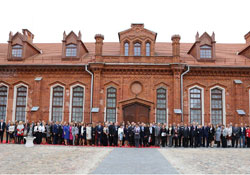RHN annual meeting 2016: reaching the Global Goals and leaving no one behind

Kaunas Region
On 22–23 September 2016, Lithuania hosted the 23rd annual meeting of the Regions for Health Network (RHN) at Raudondvaris Castle in Kaunas region. The meeting focused on how regions can implement the 2030 Agenda for Sustainable Developmen with its central role of health in leaving no one behind.
The endorsement of the United Nations Sustainable Development Goals in September 2015 represents a new opportunity to further advance the whole-of-government and whole-of-society approaches suggested by Healthì 2020. At the same time, implementing the 2030 Agenda needs policy coherence, integrated action across sectors and citizen engagement.
In her opening speech, Dr Zsuzsanna Jakab, WHO Regional Director for Europe, underlined that the intrinsic diversity within RHN is both a great treasure and its biggest strength in making collective progress in the fight against health inequalities. Dr Jakab congratulated Lithuania for being a model for health policy development in Europe.
Day 1: Health 2020 knowledge, know-how and practices
The Autonomous Province of Trento (Italy) described how it broadened the concept of health by using a participatory process to develop a strategic health plan. Veneto Region (Italy) presented its regional patient-centred approach to health care. Region Västra Götaland (Sweden) showed an example of incorporating equity into regional health plans. Finally, Wales (United Kingdom) showed how it is investing in sustainable health and well-being, and presented the results of a study visit that took place last June.
The afternoon was dedicated to how RHN members create resilient communities and sustainable environments, and to the role of regions in health services delivery transformations. Veneto Region presented the final results on water contamination. Kyrgyzstan explained the role of local village health committees in engaging patients and empowering populations in services delivery. Madeira (Portugal) discussed the role of regional health authorities and local health units in strengthening the integration of services through primary care. North West Flanders (Belgium) spoke about strengthening community-based mental health services.
Moreover, this session saw the collaboration with the WHO European Centre for Environment and Health (ECEH) based in Bonn, which has been recently placed in the Division of Policy and Governance for Health and Well-being, together with the WHO European Office for Investment for Health and Development in Venice, Italy, which operates the RHN Secretariat.
Day 2: European strategy on women’s health and well-being
Participants were informed about the Strategy on women’s health and well-being in the WHO European Region, recently approved at the 66th Regional Committee for Europe meeting in Copenhagen, Denmark, in September 2016. The Strategy is underpinned by the values of the European policy framework for health and well-being, Health 2020, which acknowledges that gender is a determinant of health and which identifies gender mainstreaming as a mechanism to achieve gender equity.
Pomurje region (Slovenia) presented its experience on a regional strategy to tackle health inequalities using intersectoral action.
The meeting concluded discussing the fruitful collaboration between RHN and the Healthy Cities Network, particularly on their shared principles, the 4Cs: complementarity, coherence, collaboration and coordination.



